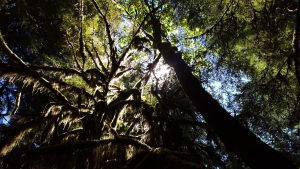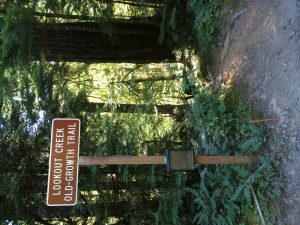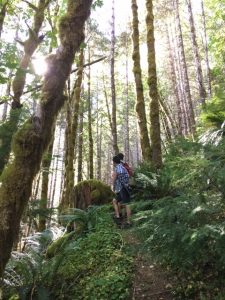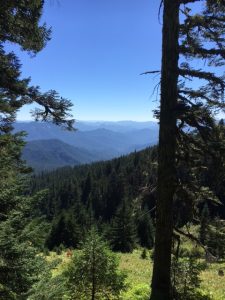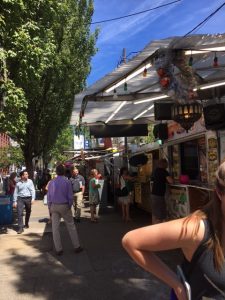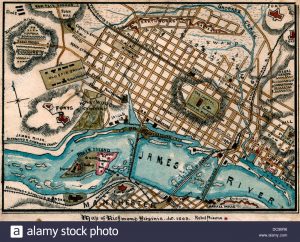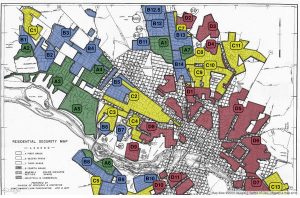Jack DeAngelis
2) Forest Under Story: Creative Inquiry in an Old-Growth Forest
Edited by Nathaniel Brodie, Charles Goodrich, and Frederick J. Swanson https://www.washington.edu/uwpress/search/books/BROFOR.html
HJA 1: In the introductory material (pages 1-14) the author asks the fundamental question, “What’s the story here?” After you have read the first chapter, answer the following questions (no more than a short paragraph per answer):
* What do you expect to observe when we visit the forests of the H.J. Andrews?
I expect to observe the combination of both untouched and preserved land while also viewing experimental sites full of equipment. At first, this apparent human trash scattered across the area will seem as a perverse defiling of the natural wonder of the old growth forest, but I hope to grow used to the homemade equipment and see the beauty of scientific data gathering.
* What are some different ways of telling the story of these forests? How do methods of creative reflection support scientific inquiry and vice versa?
It all comes down to the story of the relationship between the land and the people. Scientific inquiry is a way for the forest to speak for itself and tell its own side of the story, but it can only answer the questions that scientists ask. Poets can patiently wait for the land to reveal itself to them in a slightly more organic manner and record the story as they feel the land has told them. Additionally, scientific research can start the story while literature can frame it in a captivating and heartfelt way that penetrates the lives of others. The balance of both science and literature in this story telling project is quite breathtaking. Simply put, there are “multiple ways of knowing” (Goodrich 11) and understanding the places around us and “cross fertilization” (Goodrich 11) between the sciences and humanities is vital when telling the story of these forests.
* Why is the long-view critical to understanding the role of humans in the natural world?
The long-view is so critical to understanding the role of humans in the natural world mostly because of the urgency of issues such as climate change and the depletion of natural resources. By taking a step back and looking at the big picture, one can track the rapidly changing conditions of the planet and witness the extrapolated figures that project human kind into an unfortunate, yet self-inflicted, doomsday. Additionally, the long-view can potentially “offer keys to questions for which we don’t yet have good answers, even questions we have not yet learned to ask” (Goodrich 13). In other words, collecting information and tracking change now could prove to be very useful in the future.
HJA 2-4: For each of the main sections of the book (Part One, Two, and Three), read the Ground Work essays and at least three other entries for the section. Then answer the following questions (no more than a short paragraph per answer):
* Why was this theme chosen (e.g., Research and Revelation for Part One) to tell the story of the H.J. Andrews Experimental Forest?
The first section of this book was aptly titled Research and Revelation because scientists and poets did exactly that. To research the forest, scientists devised experiments and collected data while poets explored and observed the spaces around themselves. Both parties then experienced revelations by either interpreting data on the forest’s behalf or constructing literature in a fashion that helped to tell a story. On another level, scientists collect data and do the research while poets tug at heartstrings and experience revelations.
* What do you expect the landscape to look like from the passages in this section?
I am glad we will be visiting the Andrews during the dry, summer season as the Ground Work essays and poetry set during the winter seem damp and cold. While numerous bird species are referenced often, only a few select tree species seem to dominate the wooded areas of the Andrews. The debris and decomposition scatted among the thriving flora and vegetation should create an interesting landscape. I expect the trees to be tall, thick and utterly breathtaking.
* Provide an example or two of how the scientific context presented in the Ground Work essay is reflected in creative storytelling for the section.
The concept of reincarnation is repeatedly alluded to in many of the creative pieces while the Ground Work essays explain how new saplings grow from the decaying trucks of felled trees. This topic is clearly explained in the more scientific writings because so much research and study at the Andrews is devoted towards this natural phenomenon. It is often the main theme of the poetry because life and death are the unifiers of all people and continue to fascinate the human mind on a spiritual level. Scientists seem to research reincarnation while poets seem to experience revelations while pondering rebirth.
* What’s a question you have about the forest from reading these passages?
Is everything really covered in moss? How can a tree collect sunlight and grow if it is draped in moss?
Moss really does cover the trees as show here on the Old-Growth Look-Out trail.
* Why was this theme chosen (e.g., Research and Revelation for Part One) to tell the story of the H.J. Andrews Experimental Forest?
In an old growth forest, it is easy to forget that the landscape is alive and constantly changing. Change and Continuity reminds the reader that this forest is a dynamic place, but because a simple walk in the woods will not reveal this change, a long term view is necessary to fully experience the forest’s transformations. This section deals with change and how it is understood as a function of time.
* What do you expect the landscape to look like from the passages in this section?
I expect to see areas of clear cut forests and areas of selective cut forests. The Ground Work essays explain these forest practices, their effect on the surrounding environment and the surprisingly resilient succession of new species moving in.
* Provide an example or two of how the scientific context presented in the Ground Work essay is reflected in creative storytelling for the section.
The Ground Work essays explain change and disturbances over time which is reflected in the poetry by reminding readers that change is not necessarily bad. Yes, major disturbances can bring about losses, but there are gains, too. In New Channel, Fearnside asks, “why do we focus always on the destruction and not the regeneration?” (Fearnside 124). In another creative piece from The Mountain Lion, Fox notes the transition of symbols representing the majority’s mentality on forestry practices. This is another example of a creative story tracking the changes that come with the forest.
* What’s a question you have about the forest from reading these passages?
How much change will we witness during our short time at the Andrews? Considering such a long term project, will a few days give us enough time to witness any minute transition at all?
* Why was this theme chosen (e.g., Research and Revelation for Part One) to tell the story of the H.J. Andrews Experimental Forest?
Borrowing Others’ Eyes is all about witnessing the Andrews through unexpected or nontraditional methods. Understanding the forest ecosystem via hydrology or sound does not seem like the primary method a scientist or poet would use to better comprehend the land; however, these areas have proven very important when comprehending the forest. One may experience the forest anew by simply changing their perspective.
* What do you expect the landscape to look like from the passages in this section?
Because it is the summer, the forest should not be quite as aquatic as described in the Ground Work essay; however, I would expect it to still be very damp. The second Ground Work essay explores the soundscape of the Andrews. Many creative pieces in Part I mentioned the various birds and their sweet songs, so this is something I expect to hear during our trip along with the other sounds described in the poetry.
* Provide an example or two of how the scientific context presented in the Ground Work essay is reflected in creative storytelling for the section.
In This Day, Tomorrow, and the Next, Rogers sets up a creative situation where a blind man and deaf man walk together in a forest. This story fits perfectly with this section’s theme of seeing the forest in a new way. Because the men have limited senses to use, they must rely on the little that they do have to experience the forest around them. The physicality of the Andrews is highlighted by Rogers’ strong use of description which really places the reader in the forest. By the end of the poem, the reader may realize that they themselves are viewing the area through a new set of eyes too: Rogers’.
* What’s a question you have about the forest from reading these passages?
What is in the future of studying the soundscape? How can understanding the soundscape of a forest be used in a way to better protect the land?

